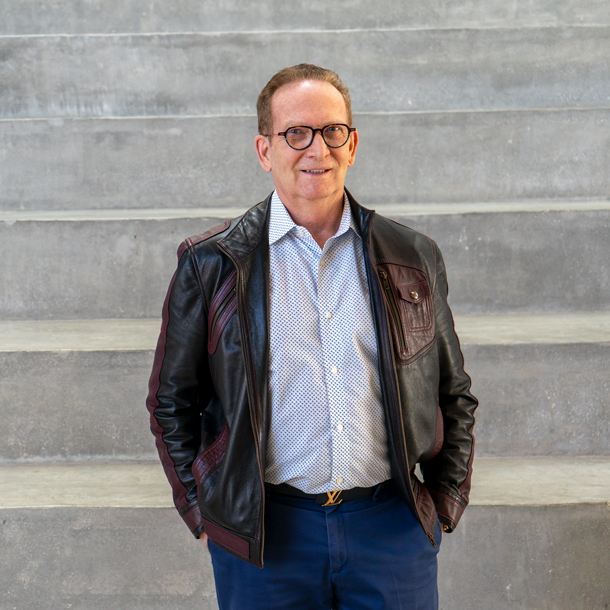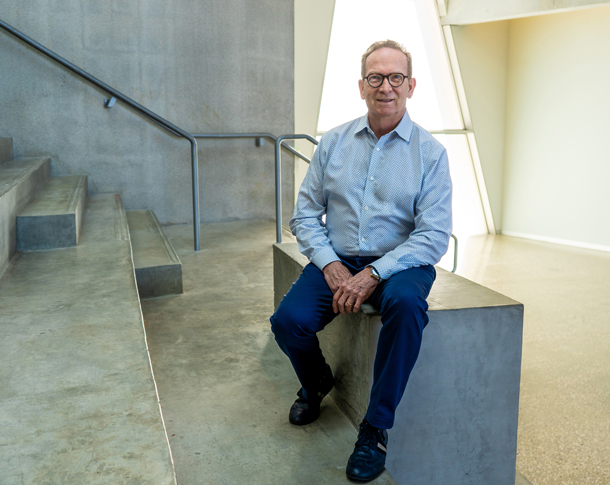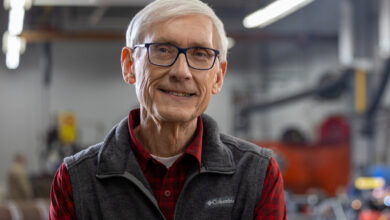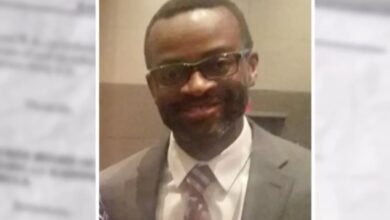
Ending the Epidemic
Dr. Gordon Crofoot leads a new HIV vaccine trial from his research center in Montrose.

Houston’s LGBTQ community is the subject of a bold step in the global response to help end HIV. The city will host one of 55 worldwide sites that will seek to enroll 3,800 HIV-negative people between the ages of 18 and 60 to participate in Mosaico, the only ongoing Phase III efficacy for an HIV vaccine. The study will be conducted through a consortium of global partners, and the Houston team will be located at the Crofoot Research Center in Montrose.
The first patient was vaccinated at the Crofoot Center in November when the program was officially announced. Dr. Gordon Crofoot, whose practice has served the community for over 40 years, will be leading the research team. Crofoot’s primary-care practice specializes in HIV/AIDS treatment, and focuses exclusively on serving the needs of Houston’s LGBTQ community.
“Houston, and the South in general, unfortunately bear a disproportionate burden of new and overall HIV infections for a variety of reasons,” says Crofoot. “It is important to look at key places where the HIV epidemic is still a concern in order to look for ways to stop it. Additionally, Houston is the most diverse city in the U.S., and research needs to ideally reflect the makeup of the population. You need to study ways to prevent HIV in all persons, not just one group. Houston is a great place for clinical research because, hopefully, we can get participation from a very diverse group of volunteers.”
Despite major breakthroughs in HIV prevention and treatment, an estimated 5,000 new HIV transmissions occur around the world every day. Men who have sex with men account for 66% of new HIV infections in the U.S. An estimated 25,831 people were living with HIV in Houston in 2017. That same year, the City documented 1,133 new HIV transmissions, in comparison to 1,292 in 2016.
Black and Hispanic/Latinx communities in Houston bear a disproportionate burden of HIV. Between 2013 and 2017, an estimated 48.2% of all new HIV transmissions occurred in Houston’s African-American community, followed by 34.8% for Hispanic/Latinx transmissions and 12.9% for white transmissions. Among transgender communities, 12 trans men and 252 trans women people were reported to be living with HIV in 2017.
In the last few years, the use of PrEP (pre-exposure prophylaxis) has increased as a form of HIV prevention throughout the world. This particular Mosaico study is testing a vaccine that would potentially add a preventative vaccine to the arsenal of HIV prevention tools—ensuring a biomedical option is available for those who can’t or would prefer not to use PrEP.

“Advances in medicine have given us several new options for HIV prevention, but a vaccine would vastly accelerate our vision for ending the HIV epidemic worldwide,” said John Huckaby, CEO of AIDS Foundation Houston. “We are pleased to learn that Dr. Gordon Crofoot and his clinical team have been chosen as one of 55 research centers worldwide for the Phase III clinical trial of a potential HIV vaccine.”
Pharmaceutical companies will often team with public entities to provide funding for treatment and vaccine research studies like this one. These public-private partnerships can provide a mutual benefit: successful studies can yield ways to treat, prevent, and end public health crises like HIV while also creating profitable new drugs for the drug companies. The United States still lacks the political fortitude to solve the problems presented when successful drugs like PrEP are sold at price points that are unattainable for many. However, the importance of the work is nonetheless worthwhile.
Mosaico is supported by a partnership led by Janssen Vaccines and Prevention B.V., a part of the Janssen Pharmaceutical Companies of Johnson & Johnson; the National Institute of Allergy and Infectious Diseases, which is part of the National Institutes of Health; and the NIAID-funded HIV Vaccine Trials Network. Additional partners providing support include the U.S. Army Medical Research and Development Command.
If the vaccine is a success, it will need to be studied in larger populations that include cisgender women, and in parts of the world with more subtypes of HIV than are found in the United States, i.e. Sub-Saharan Africa. Vaccines that show marked promise in clinical trials can be given what is called fast-track status, since there is such an urgent need to get an HIV vaccine approved and out in the community.
“Anyone who may be at risk for HIV and does not feel that PrEP is a good option for them, or is unable to take PrEP for whatever reason, is a good candidate for this study if they are interested,” says Crofoot. “This current study is only open to men who have sex with men, and transgender people. If someone who fits that criteria is interested, they can contact the Crofoot Research Center at 713-526-0005 and we can go over more specific eligibility criteria.”
For more information about Crofoot Research Center, visit crofootmd.com/research-center.











Comments